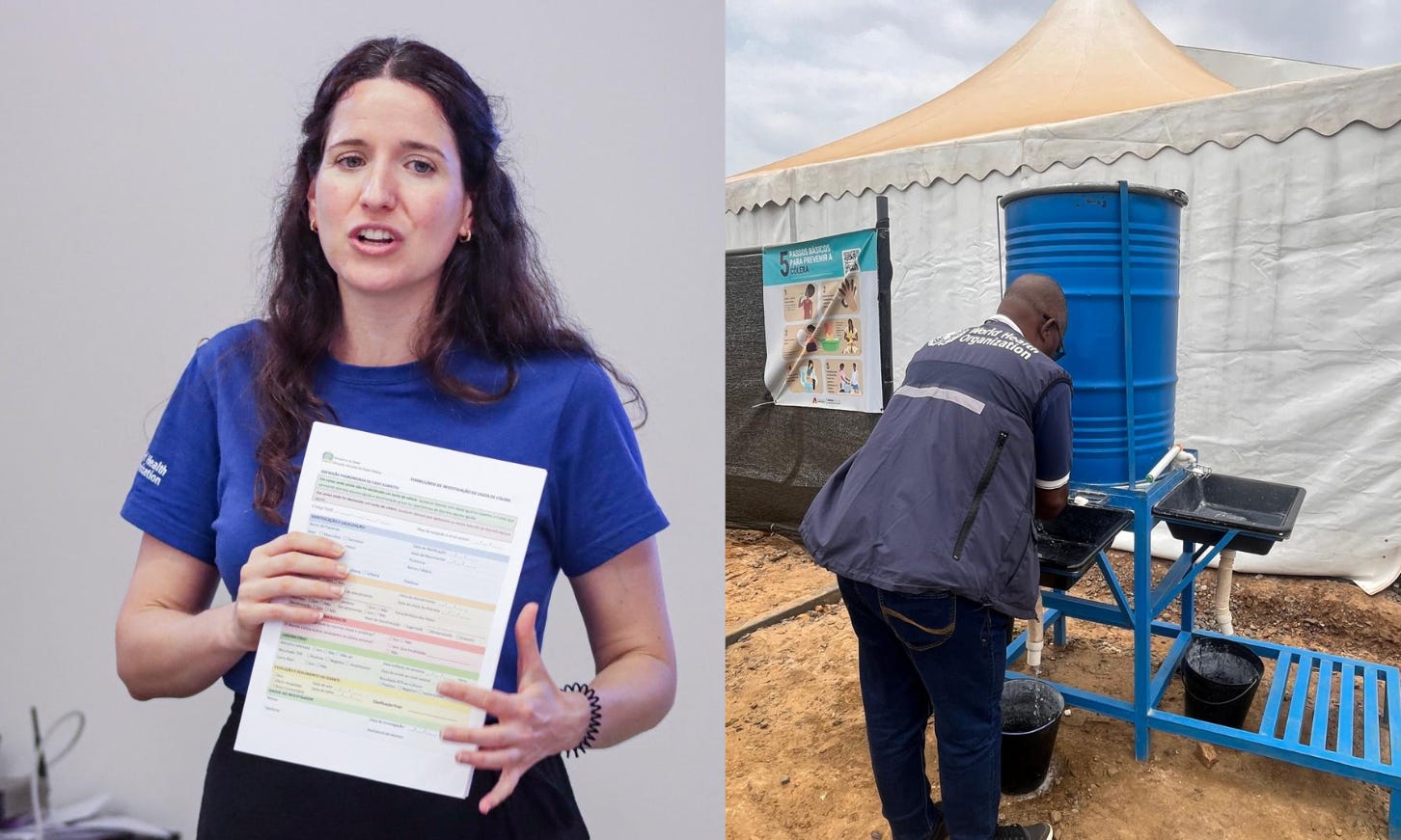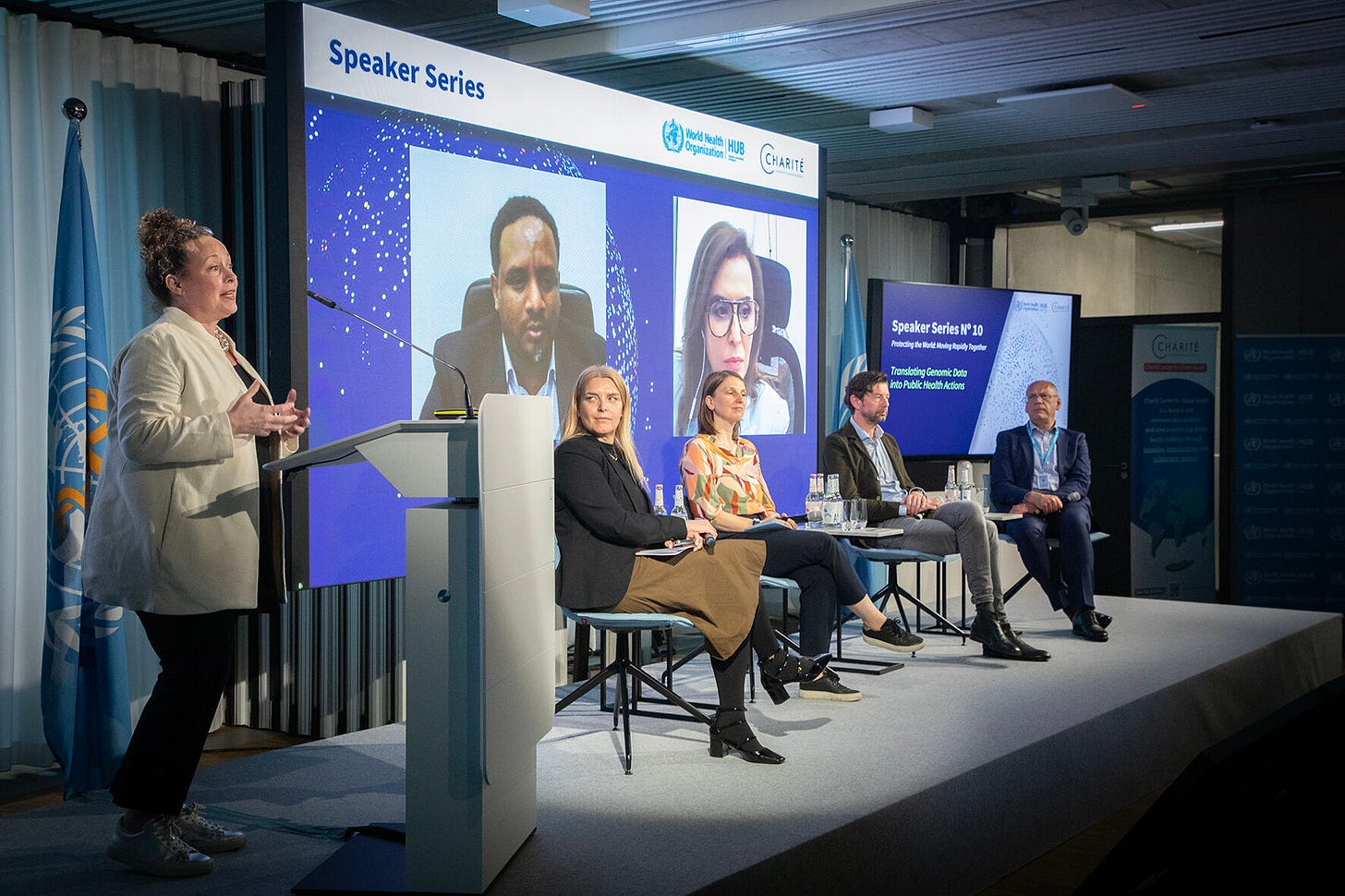Welcome to the WHO Hub for Pandemic and Epidemic Intelligence newsletter! Here we bring you the latest updates on our transformative approach to collaborative surveillance so that countries are better equipped to detect, monitor and manage public health threats.
Each month, we’ll spotlight key projects, share insights from our experts, recommend resources and highlight upcoming events and opportunities.
We look forward to hearing from you! If you have feedback or questions, you can contact us here.
📢 Voices from the Hub
“My name is Raquel Medialdea, and I’ve been working as an epidemiologist at the WHO Hub in Berlin for the past two and a half years. My daily work focuses on strengthening public health intelligence capacities in Member States around the world. This means I support countries in developing the skills and using the tools they need to detect health threats more quickly, analyze the data effectively and make informed decisions to protect their populations during health emergencies.
In February 2025, I deployed to Angola to support the WHO Country Office and the Angolan Government in responding to the country’s largest cholera outbreak in nearly 20 years. As of 6 May, more than 18 000 cases and nearly 600 deaths have been reported. The high mortality is linked to limited access to clean water and sanitation, fragile health systems, and high population mobility. This is a major public health emergency requiring a coordinated, data-driven response.
Since arriving, I’ve been working closely with Angola’s National Public Health Directorate, the Ministry of Health, and our WHO country office to strengthen cholera surveillance, data analytics, mapping, and operational research, all key tools for understanding and controlling this worrying epidemic. I also support vaccination campaigns, partner coordination, communication, resource mobilization and basically, anything else that is needed. It is incredibly inspiring to work alongside the expert colleagues in Angola, both in the WHO Country Office and the Angolan health authorities.
The epidemiological analysis of cholera is the backbone of our response, it helps us make data-informed decisions, allocate resources efficiently, and rapidly adapt our response. In outbreaks like the current epidemic in Angola, strengthening surveillance systems is crucial to capturing the evolving situation and ultimately controlling this outbreak.
While there are many challenges, they also represent opportunities for innovation and collaboration. Together, we are committed to supporting the great work of Angola toward ending this epidemic and restoring public health resilience.
As we face the rainy season, we continue working tirelessly to prevent more deaths. As they say here, “Ainda estamos na luta, mais estamos juntos.” (We are still fighting, but we are together). Our goal is clear: to reach zero deaths from cholera. No one should die from a preventable disease.
➡️ Read more about the response to Angola’s cholera outbreak.
📺 What to watch
In May, we had the pleasure of welcoming a team from Germany’s national public broadcaster ZDF to the WHO Hub in Berlin. For their science programme NANO, they took a look behind the scenes and spoke to our colleagues about their work to strengthen countries’ ability to detect, monitor and respond to health threats.
The feature highlights Berlin’s growing role as a centre for global pandemic preparedness and shows how the WHO Hub brings together experts from across sectors and borders to support countries in preparing for future health emergencies.
➡️ Watch the feature “WHO Hub: Berlin rückt ins Zentrum der Pandemieabwehr” (in German).
📖 What to read
In 2024, the World Health Organization, the UN’s Food and Agriculture Organization and the World Organisation for Animal Health, jointly developed the Competencies for One Health Field Epidemiology (COHFE) framework. This framework defines the knowledge, skills and competencies needed to train field epidemiologists to apply the One Health approach, which recognizes that the health of people, animals, plants, and our environment are closely interlinked. Implementing this new framework will help build a stronger, more collaborative field epidemiology workforce, better equipped to protect global health. A joint paper which details the collaborative, inclusive and iterative process by which the framework was developed, has now been published in the journal One Health Outlook.
➡️ Find out more about the COHFE framework.
🔁 What to share
Together with the Charité Center for Global Health, we successfully co-hosted our tenth Speaker Series “Translating Genomic Data into Public Health Actions”, which was attended by hundreds of participants from around the world, both virtually and at the WHO Hub in Berlin. Speakers from the Africa CDC, the American University of Beirut, the Charité University, the Robert Koch Institute and the Wellcome Sanger Institute underscored the importance of effective genomic surveillance. They shared real-world examples of how genomic data is being used at country, regional and global levels, and highlighted the infrastructure, innovation and collaboration required to turn genomic data into actionable public health insights.
➡️ Read and share our LinkedIn post with key highlights of the session.
Follow us on LinkedIn
The WHO Pandemic Hub is on LinkedIn! Follow us for regular updates in English and German on how we support public health intelligence communities worldwide with innovative solutions, knowledge-sharing networks and stronger systems for better decisions during epidemics and pandemics.
👉 Follow us and leave us a comment, share or like!








